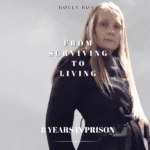
In November, five months after our visit, I was given terrible news. Prison staff retrieved and delivered me to my caseworker, who told me Social Services in Washington state had called her. My youngest son Tim, now aged 11, was in hospital for emergency surgery. Terrified, I imagined Timmy as he was in our last visit. “I don’t want to leave, Mom,” Timmy pleaded. “Can’t I live here with you?” His skinny legs kicked against the chair, feet not reaching the floor. His shoulders slumped as he stared at his hands. He tried to smile and my heart broke.
My caseworker had no other information. It would be many days before an I received an update. I was so scared for Tim. ‘How will this affect the rest of my family?’ I wondered.
I entered prison with a strong sense agency which slowly eroded into defeat. I’m not referring to temporary discouragement. I’m describing a core identity change. According to the article Self- Efficacy: The Foundation of Agency by Albert Bandura: “Unless people believe they can produce desired effects by their actions, they have little incentive to act.”
I desired information and knowledge as keys to strategic decision making. Prison starves one of information and I’d suffered this data deficit for years. According to another research article, “Power allows people to control outcomes… This control is considered to be a fundamental human need… powerlessness may cause people to feel as if they possess fewer Human Nature traits.”
Without information to act, the power to act, and good results, I felt diminished. Unexpected events often overwhelmed me, leaving me feeling ungrounded. Failure to appear somewhere was a reason for discipline, yet advance notice of an appointment was disallowed.
One morning the prison added me to the daily roster of appointments, which is posted in each unit. At 1pm I had a Property appointment, but I also started work in the gym at 1pm. Unsure how to navigate this overlapping schedule, I asked for help. Guards and staff couldn’t advise me, they didn’t know the answers. Chaos reigned but Punishment ruled here. Everyone’s best guess – go to Property first; so I did, but I made a mistake in procedure. Compounding the mistake was a recent inmate escape attempt. A new arrival raced past a guard into neighboring properties. The inmate was quickly retrieved, but this event had staff on edge.
Without a fence, Shakopee managed inmates using sign-out books and locked buildings. Every hour a 5 minute “movement” was called over the prison loud speakers. Buildings then opened, people moved, buildings closed. Work sites then reported in as sign-out books were reviewed. All inmates must be accounted for at all times!
This day I leaned against the wall across from Property, urging the window up so I could hurry on to my worksite. We were never permitted to run during movement times. Running might resemble an escape attempt. As movement opened I’d fast-walked it to Property, a ridiculous hustle – arms straight, elbows locked, legs churning. I was first in line and hoped to finish my business so quickly I would make it to work before movement closed. My heart pounded. Was I doing things right? No.
The problem was, I’d signed out wrong, forgetting to mention a stop at Property on my way to work. My worksite reported my absence and sign out books said I should be there. I was declared a missing inmate. Alarms ripped across the campus. Bundled in my winter coat, holding an armful of books I sighed. ‘Great, a delay,’ I thought, ‘just as I need a fast appointment here.’ Radios squawked to life across the counter from me. “We have a missing inmate. AHO. I repeat, missing inmate. AHO,” they blared. A flurry of panicked activity erupted around me.
I pushed off the wall and spoke into the sudden chaos. “I’m Aho.” No one noticed. Clearing my throat I repeated louder, “I’m Aho. I’m right here!”
Heads whipped up. Behind the counter an older guard slapped her hand on the counter and spat, “Where’s your ID badge?” It was pinned to my shirt, trapped under layers of winter clothing. Shifting books in my arms I struggled for it. The coat zipper caught, my books slipped to the floor with a crash. Pounding the counter she demanded, “WHERE’S YOUR ID BADGE!!”
Stunned, I froze. Time stopped, everyone held their breath. With shaking hands I stepped to the counter, freeing my badge with a snap. “Here,” I said.
Jerking the card to her nose, she squinted. “Next time a guard asks you to do something, you don’t ignore it! Understand?” She growled. “You do it!” she snapped. She peered over her glasses at me, scowling. More guards swooped in, lifting me off my feet. My pockets were searched, turned inside out, and I was yanked down the hallway to a holding room. Tossed inside, a metal door clanged behind me.
Left alone I shuffled to the metal bunk and sat., studied the block wall. Somehow graffiti was on it, so I read it. Words were scratched into the paint of the bunk and I read that too. Then I laid down and cried. A guard came to taunt me through the window of the cell. “I heard you had a really bad attitude at the Property window! Gave the guards there a real hard time!” she said. I didn’t know how to respond, so I cried harder. Eventually released I was sent to my room and given DLOPs for being in an unauthorized area. I collapsed on my bed.
Timmy recovered from his surgery. From hospital he was placed in foster care. A lawyer in Washington state was initially assigned to me. She was useless, totally ignoring me. I had no phone number to call Tim, and months went by without any new information. Feeling anxious and overwhelmed depression came back and again I began missing work, sometimes intentionally by taking a sick day, sometimes because I lost track of days and times.
I was fired from the gym in December and placed on UI (Unassigned Idle status). I would spend the next 3 months locked in my room 21 hours a day.
UI means unemployed. Warehoused. Typically the prison bunks women on UI status together in the same cell, locked in at all times except for meals and a short break. Instead the prison put me in a cell with Pam, who worked in balloons. At first I was grateful. Pam worked full-time and I had the room to myself. Pam had several drawbacks as a roommate, however.
One night I found the toilet paper dispenser empty and added a new roll of toilet paper, rolling away from the wall. The next morning I found the toilet paper roll flipped around, rolling towards the wall. I thought nothing of it, until it happened two more times. She never said anything. Soon Pam unveiled her worst trait as a roommate, terrible gas which she enjoyed making worse with a strong cup of coffee. If she was mad at you she’d drink several cups. Eyes stinging with tears from the smell I began hanging sweet smelling dryer sheets all over the room.
I tried to use this time for self-reflection. I borrowed books about depression and tried to understand why I was stuck. I put a huge effort into recovering, had done so for years, and yet I never got better. ‘I will never be cured,” I thought as I finished another book. ‘What hope is there for my life?’ The term “mental health” had taken great importance in my life. I never considered my “spiritual health.” Accepting defeat I began searching for ways to survive within the limitations of depression.
While Tim remained in foster care I’d been forgotten by the court as his parent. Finally in February I risked asking a guard if I may call my attorney again, though it was not my time to be out of my room. He said yes and I did.
“Hello?” she answered, surprised to be hearing from me.
“Hi,” I responded. “I have not received any news about my son since last November, and now it is February. I was told he had emergency surgery and then went into foster care. You are my attorney? How is he? When can I speak to him? How do I contact my son?”
Surprise leaked out of her voice as she answered, “No one has contacted you?”
It was my turn to be surprised. Who would contact me? What should I expect? “No, no one,” I threw back. “What is going on?”
“You have a right to visit your son, which in your case would be by phone. You have a right to all information and reports regarding him as well. I’m surprised no one has contacted you before now,” she rejoined.
I thought but did not say, ‘Why didn’t you contact me, aid me in acquiring my rights?’ Instead I asked, “How can we start that process? Let’s get that done now, please.” Soon phone calls were arranged around my limited UI schedule, made more challenging by the 2 hour time difference. I looked forward to receiving a job again so I could be more available. Even more upsetting was the sudden price hike to call Tim, which increased from 50 cents to $5 for a fifteen minute call. Torn in many directions, I struggled to support all of my children emotionally. I switched to writing more letters and calling less frequently. I began selling jewelry and sketches to inmates for money.
Social services reports began arriving from Washington. Horrible. Crushing. Painful to read, they were also outrageous. In addition to poverty as a barrier in communication, prison shakedowns, raids, riots and lockdowns created an impediment to scheduled phone visits with my son. Failure on my part to call Tim for any reason would be written up as “a refusal on Ms. Aho’s part, an uncaring mother, to visit her son.” Often I cried in my room during a prison lockdown mere feet from the phone during a scheduled visit, unable to call. I raged against these lies, mischaracterizations, growing to hate Social Services.
The article The Impact of Power on Humanity: Self-Dehumanization in Powerlessness explains that Human Nature (HN) traits are core human qualities, like emotion and connection. When people are treated like objects (mechanistic dehumanization), they often lose sight of these traits in themselves, leading to emotional numbness and detachment.
I became increasingly withdrawn, disconnected and numb, laying in my room for hours, locked in. My weight increased and I hated life, myself. In March 2014 I was finally assigned a job in maintenance. I had nearly 2 years to go before I would experience hope.
9 Men of low degree [in the social scale] are emptiness (futility, a breath) and men of high degree [in the same scale] are a lie and a delusion. In the balances they go up; they are together lighter than a breath. 10 Trust not in and rely confidently not on extortion and oppression, and do not vainly hope in robbery; if riches increase, set not your heart on them. 11 God has spoken once, twice have I heard this: that power belongs to God. Psalm 62:9-11
2 https://journals.plos.org/plosone/article?id=10.1371/journal.pone.0125721#sec035
Discussion Questions:
- Holly describes a situation where she was not informed about her youngest son’s emergency surgery promptly. How important do you think timely and accurate information is in making decisions, especially during challenging circumstances? Have you ever faced a situation where you felt uninformed or lacked crucial information?
- Holly describes challenges in navigating the prison’s scheduling and appointments, leading to a situation where she was unknowingly labeled as a missing inmate. How does the lack of transparency in scheduling and communication impact Holly’s experience, and can you relate to facing challenges due to lack of information in your own life?
- The passage narrates an incident where Holly is wrongly identified as a missing inmate, leading to her confinement and emotional distress. Have you ever experienced a situation where you were wrongly accused or misunderstood? How did it impact you emotionally?
- Holly shares her struggles with depression, weight gain, and a sense of numbness during her time in prison. Can you think of instances where mental health impacted your ability to cope with challenges? Do you need help with issues like these today?
- The passage touches on Holly’s efforts to maintain connections with her children through letters and phone calls despite the challenges. How important do you think maintaining connections with loved ones is during difficult times, and how do you prioritize such connections in your own life? Are you facing relationship challenges today?
- The biblical passage from Psalms emphasizes the idea that power belongs to God. Have you experienced a reliance on faith during difficult times?
READ MORE
- Chapter 1: JAILIntake process at the county jail passed in a blur. Well that’s not exactly true. It dragged on, so boring it became forgettable. An officer transported me by police car from the local police station to the county jail. Hands cuffed behind me, I sat on a hard plastic seat in the back. The jail… Read more: Chapter 1: JAIL
- Introduction: Get to know From Surviving to Living!Click to rate this post! [Total: 0 Average: 0]
- Chapter 2: BAIL, SENTENCING, & PRISON INTAKEReleased on bail after 3 months in jail, Chad arrived to bring me home, telling me in the car, “We’re being evicted and everything has to be out of the house by the end of the day.” At home nothing was packed or ready for a move. We failed to meet the end of the day deadline… Read more: Chapter 2: BAIL, SENTENCING, & PRISON INTAKE
- Chapter 3: GROWING UPClick to rate this post! [Total: 0 Average: 0]
- Chapter 4: ORIENTATION (CHANGE, SHOCK & AWE, SUICIDE WATCH)Part One March 2011 – September 2015 “There is none righteous [none that meets God’s standard], not even one.” ~Romans 3:11 (AMP) “The way of the wicked is like [deep] darkness; they do not know over what they stumble.” ~Proverbs 4:19 (AMP) On my second day in prison the prison placed me in a two week orientation… Read more: Chapter 4: ORIENTATION (CHANGE, SHOCK & AWE, SUICIDE WATCH)
- Chapter 5: MARRIAGEJust before my 19th birthday, I married Scott, a man I had dated in high school. On a whim we drove to Las Vegas with some friends and got married. My parents were upset by my impulsive decision. They asked me, “What were you thinking? Why did you do that?” It wouldn’t be the last time I… Read more: Chapter 5: MARRIAGE
- Chapter 6: A PADDED ROOM (THE PICKLE SUIT)Suicide watch in Shakopee takes place in the facility’s segregation unit. While inmates are taken to seg for disciplinary reasons, it is also used for suicide watch and health concerns. Soon I would be seeing it for myself. Seven months had slid by since my arrival at prison. One Thursday night I called my parents’… Read more: Chapter 6: A PADDED ROOM (THE PICKLE SUIT)
- Chapter 7: WoWAs I waited to be released from seg, I received a kite (internal institutional mail) from the director of Shakopee’s Women of Wellness program (WoW). She invited me to participate in the six week “in-patient” mental health program. I would be transferred to Monahan, Shakopee’s mental health living unit. I felt a little excitement. I would get… Read more: Chapter 7: WoW
- Chapter 8: RING TOSS & DOPPELGANGERSMy job in General Assembly (Rubber) was housed in a large warehouse building shared by several educational and industry job opportunities. There were 2 main jobs – ring inspections and cutting rubber. I was assigned to rings. Base pay was 50 cents. Working rings started by retrieving a tub of gaskets and returning to your… Read more: Chapter 8: RING TOSS & DOPPELGANGERS



























